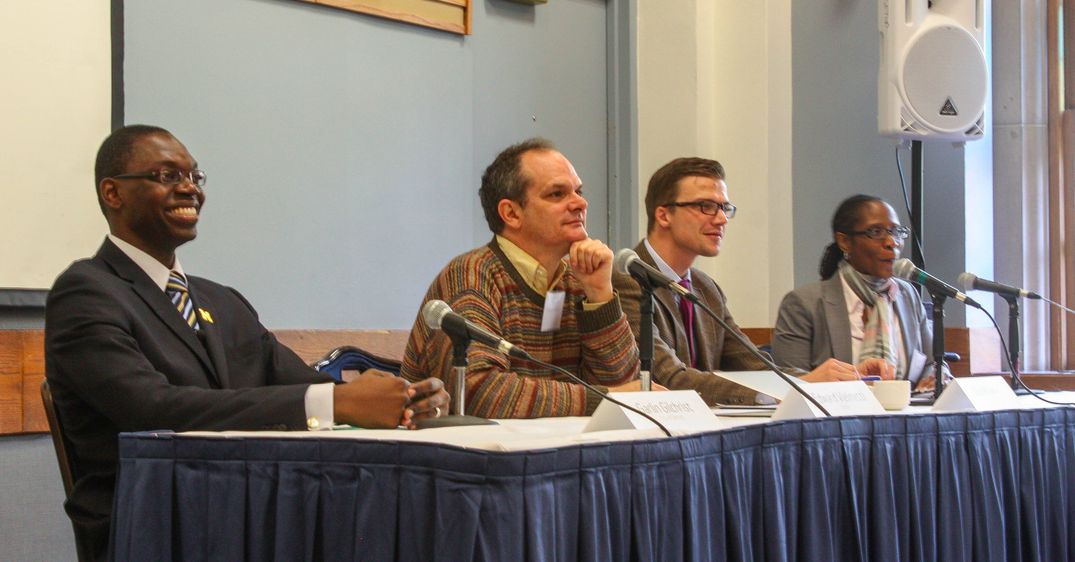Connecting state and local government leaders
In advance of a Sept. 26 “unconference” on urban informatics in Ann Arbor, Route Fifty discusses the intersection of data, municipal governance, planning and innovation.
Robert Goodspeed, an assistant professor of urban planning at the University of Michigan’s Taubman College of Architecture and Planning, is gearing up to help host an “unconference” on urban informatics on Sept. 26 in Ann Arbor. He previously helped organize the MIcities 2014 conference at the University of Michigan, which drew more than 120 speakers and participants from around the state of Michigan.
This time around, the event is less structured—hence, the “unconference” format—but it aims to cover a wide range of topics of interest, including, according to a backgrounder:
- Mapping and spatial analysis of urban phenomena conducted with desktop or online GIS
- Citizen interaction design of technologies for participation, and knowledge creation
- Ubiquitous urban information is the use of innovative information technologies to create pervasive computing environments - or the city as a computer
- Analysis and visualization of urban data from traditional and new sources, including administrative datasets, big data, social media, and others
- Creation of open data and application programming interfaces to facilitate analysis and unlock public value
- Modeling to better understand urban systems
- Implementation discussions encompassing social entrepreneurship, intrapreneurship, design thinking, and collaborative planning and governance
- Examination of legal and policy issues including privacy, copyright, open licensing and public safety
- Debate about “smart city” concepts, examples, and technologies
Goodspeed, who holds a PhD in urban planning from the Massachusetts Institute of Technology and a master’s degree in community planning from the University of Maryland, previously worked as a research analyst at the Metropolitan Area Planning Council and in 2010 served as a public policy fellow in the Mayor’s Office of New Urban Mechanics at Boston City Hall.

A big disclosure: I’ve been friends with Goodspeed for 15 years. We were undergraduate classmates at the University of Michigan and we co-founded the Washington, D.C.-area news site DCist.com in 2004. All these years later, our professional lives intersect on topics related to data, planning and municipal operations.
On a recent trip through Ann Arbor, I sat down for breakfast with Goodspeed to discuss the upcoming Urban Informatics Ann Arbor 2015 unconference he’s been organizing and some of his observations on data-driven municipal governance in Southeast Michigan and how academic communities can collaborate with their local governments.
Here’s part of our discussion:
Route Fifty: What is urban informatics?
Robert Goodspeed: I've been interested in the intersection of information technology and cities for many years, especially the ways technology can be used for more democratic and informed governance and planning. Like many areas where there is a lot of innovation, it's an area where a bunch of terms are being used by different people to refer to the same general area. I've decided to use the term "urban informatics" for a couple reasons.
First, in the last few years, I've seen more and more job postings for positions which call for a combination of urban knowledge with technical skills, such as statistics, GIS, Python, or web programming. There's also been a growing interest in topics at the intersection of IT and cities, such as smart cities, open data, civic technology and urban indicators. While it's a very dynamic area, there's definitely an emerging field made up of people who combine forms of knowledge typically taught separately in universities.
Second, other fields are also seeing the emergence of sub-fields working at similar intersections. For example, the University of Michigan has graduate programs in health informatics and environmental informatics. I like one definition of informatics proposed by Charles Friedman, who argues that it is intersection of basic information sciences and a particular application domain. I also like how, unlike other terms like urban science or data analytics, informatics reminds us there are a range of social and institutional factors we need to consider, from questions of privacy to public participation.
At a personal level, I approach urban informatics from the perspective of my home field of urban planning, which has a distinctive base of knowledge about strategic, long-term thinking and action. So maybe I'd stick the word "planning" in there at some point.
Route Fifty: When you were at MIT, you worked at the Mayor's Office for New Urban Mechanics at Boston City Hall, which has been regarded as one of the nation's top municipal labs to experiment and tinker with the nuts and bolts of data-driven local government and management. From your vantage point at the University of Michigan, where do local governments in Southeast Michigan stand in the world of data-driven governance and management? What are some of challenges and opportunities you're seeing?
Goodspeed: Based on my limited experiences, I think big city governments are much more diverse in terms of their operations and technology use than many people realize. So it's very hard to compare different cities, since they have different political priorities, legal powers and structure, and legacy systems to deal with. What I found interesting about the Office of New Urban Mechanics is their focus on municipal innovation, and I think all cities—regardless of their size—should try to find ways to foster innovation through the savvy use of technology. The exact priorities can and should vary according to the available resources and major issues cities are facing.
Even more than many U.S. regions, Southeast Michigan is highly fragmented politically. For example, the seven counties which are often used to define the region contain some 238 municipalities. That means most of the municipal innovation will be different than what is possible for large cities like Boston or Chicago. The City of Detroit, despite facing huge institutional challenges, is making huge strides under the leadership of Mayor Duggan. This includes the launch of an an open data portal, and work developing a civic technology approach that makes sense for their context. The local jurisdictions vary, so this creates the potential for diverse experimentation, but also a need for improved regional collaboration.
Route Fifty: How can universities and other academic institutions assist local governments in the area of urban informatics? What are some of the projects the University of Michigan has been involved with locally?
Goodspeed: There's many models for city-university collaboration. Here at Michigan, in the urban planning program our graduate students work on capstone projects with community partners, which often demonstrate good analysis or contain recommendations on technology-related topics like community indicators. Another example is an interested project being led out of the University of Michigan School of Information on Citizen Interaction Design, who is a co-sponsor for the unconference. This project has entered into a multi-year partnership with the City of Jackson, which partners University of Michigan students with different city stakeholders. Some of the results have been a new open data policy, and new tools to address local issues like vacant property and child immunization. I'm excited by projects like this, which don't enter cities with a fixed agenda for what they should be doing, but instead work to understand the existing technology and problems, and develop tailored solutions.

Route Fifty: The structure of an unconference is, well, unstructured. What are some of the objectives for the upcoming urban informatics unconference in Ann Arbor?
Goodspeed: We decided to adopt the unconference format since it seemed appropriate for such a dynamic topic. Faculty across campus are working on related research, and don't often connect nearly enough. Last summer, students from my classes mapped urban data in India, worked on the data systems for a local bus system, and worked with the latest 3D modeling tools at ESRI. Here in Metro Detroit, there's a vibrant technology cluster and a civic technology community. So the purpose of the event is to bring all these people together to see what we can learn from one another.
Michael Grass is Executive Editor of Government Executive’s Route Fifty.

NEXT STORY: Newark Mayor’s ‘Urban Marshall Plan’ Idea; Iowa Rethinks Roadside Mowing




